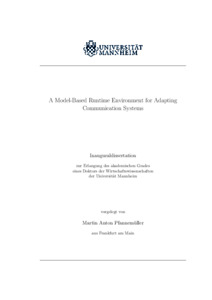|
A model-based runtime environment for adapting communication systems
Pfannemüller, Martin
![[img]](https://madoc.bib.uni-mannheim.de/58893/1.hassmallThumbnailVersion/Dissertation_MartinPfannemueller.pdf)  Vorschau |
|
PDF
Dissertation_MartinPfannemueller.pdf
- Veröffentlichte Version
Download (7MB)
|
|
URL:
|
https://madoc.bib.uni-mannheim.de/58893
|
|
URN:
|
urn:nbn:de:bsz:180-madoc-588930
|
|
Dokumenttyp:
|
Dissertation
|
|
Erscheinungsjahr:
|
2021
|
|
Ort der Veröffentlichung:
|
Mannheim
|
|
Hochschule:
|
Universität Mannheim
|
|
Gutachter:
|
Becker, Christian
|
|
Datum der mündl. Prüfung:
|
16 Februar 2021
|
|
Sprache der Veröffentlichung:
|
Englisch
|
|
Einrichtung:
|
Fakultät für Betriebswirtschaftslehre > Wirtschaftsinformatik II (Becker 2006-2021)
|
|
Fachgebiet:
|
004 Informatik
|
|
Freie Schlagwörter (Deutsch):
|
Selbst-adaptive Systeme , Laufzeitumgebung , Modellbasierte Spezifikationen , Kommunikationssysteme
|
|
Freie Schlagwörter (Englisch):
|
self-adaptive systems , runtime environment , model-based specifications , communication systems
|
|
Abstract:
|
With increasing network sizes, mobility, and traffic, it becomes a challenging task to achieve goals such as continuously delivering a satisfying service quality. Self-adaptive approaches use feedback loops to adapt a managed resource at runtime according to changes in the execution context. Adding self-adaptive capabilities to communication systems-computer networks as well as supporting structures such as overlays or middleware-is a major research focus. However, making a communication system self-adaptive is a challenging task for communication system developers. First, the distributed nature of such systems requires the collection of monitoring information from multiple hosts and the adaptation of distributed components. Second, communication systems consist of heterogeneous components, which are, e.g., developed in different programming languages. Third, system developers typically lack knowledge about the development of self-adaptive systems. Hence, this work's overall goal is to allow system developers to focus on making a (legacy) communication system adaptive. Motivated by these observations, this thesis proposes a model-based runtime environment for adapting communication systems called REACT. In contrast to self-adaptation frameworks, which offer a standard way to build self-adaptive applications, we refer to REACT as a runtime environment, i.e., a platform that is additionally able to plan and execute adaptations based on user-specified adaptation behavior. REACT includes the support for decentralized adaptation logics and distributed systems, multiple programming languages, as well as tool support and assistance for developers. The developer support is achieved using model-based techniques for specifying the reconfiguration behavior of the adaptation logic. Also, this thesis proposes an easy-to-follow development process. As part of that, it is needed to monitor the reconfiguration behavior of the self-adaptive system. Hence, this work also presents two dashboard-based visualization approaches called CoalaViz and EnTrace for providing traceability of self-adaptive systems for system developers and administrators. This thesis follows a design science research methodology resulting in the design and implementation of the final artifacts. By that, this dissertation presents different REACT Loops, including specific ways to model and plan the adaptive behavior using satisfiability, mixed-integer linear programming, and constraint solvers. The prototypes of these approaches, including the two visualization solutions, are evaluated in multiple use cases. Therefore, this work provides an end-to-end solution for specifying the adaptive behavior, connecting a managed resource, deploying the system, as well as debugging and monitoring it.
|
 | Dieser Eintrag ist Teil der Universitätsbibliographie. |
 | Das Dokument wird vom Publikationsserver der Universitätsbibliothek Mannheim bereitgestellt. |
 Suche Autoren in Suche Autoren in
Sie haben einen Fehler gefunden? Teilen Sie uns Ihren Korrekturwunsch bitte hier mit: E-Mail
Actions (login required)
 |
Eintrag anzeigen |
|
 ORCID: 0000-0003-4255-3482
ORCID: 0000-0003-4255-3482



 Suche Autoren in
Suche Autoren in